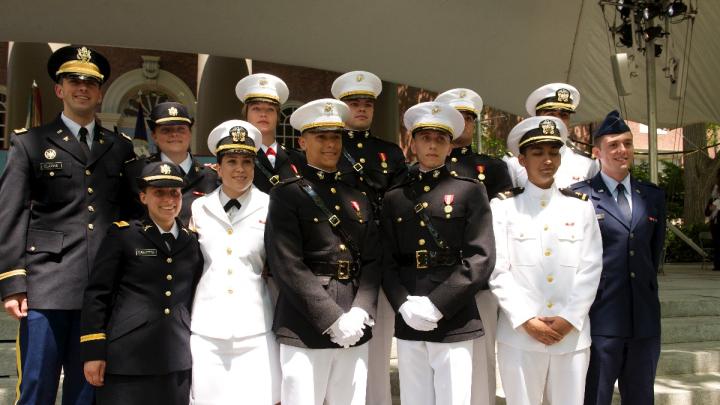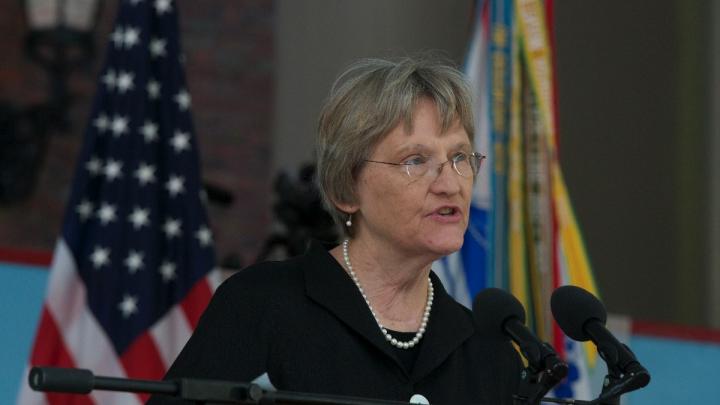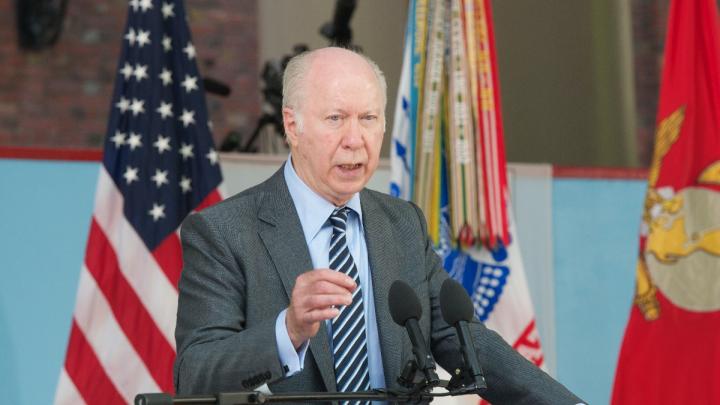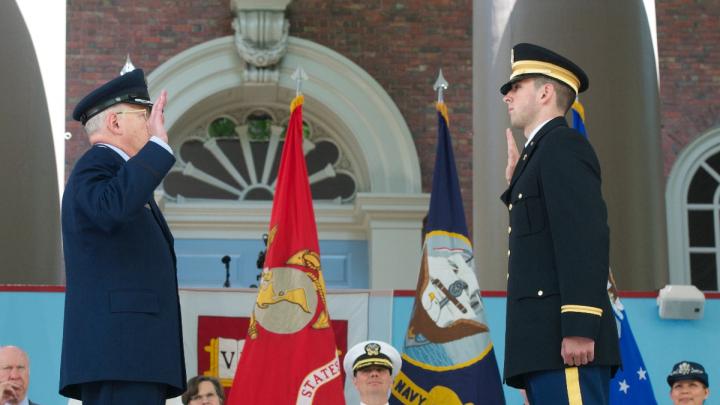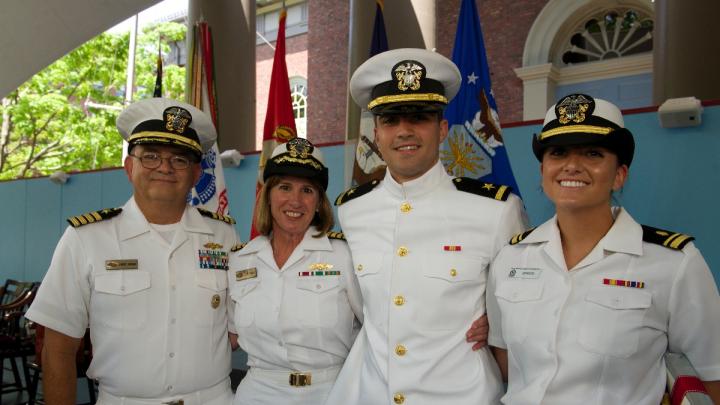A round dozen of Harvard students—the largest contingent since 2010—took their oaths of office, respectively, as second lieutenants in the U.S. Air Force, Army, and Marines or ensigns in the U.S. Navy on Wednesday morning during Commencement week’s annual Reserve Officer Training Corps joint commissioning ceremony. The four women and eight men included 10 members of the class of 2016, a member of the class of 2015, and a master’s candidate from the Graduate School of Design. Their names appear in the attached program; their immediate future responsibilities range from The Basic School in Quantico, Virginia, for the five new Marine Corps officers and the Naval Nuclear Power School in Charleston, South Carolina, for the three ensigns, to various Basic Officer Leaders Courses for the three army lieutenants in Kentucky, Georgia, and Arizona and pilot training for their Air Force colleague in Texas.
This year’s ceremony likely had special resonance for military veterans among the several hundred families, friends, and reunioners gathered in the Tercentenary Theatre audience: in April, President Drew Faust and Air Force Secretary Deborah Lee James had signed an agreement establishing an Air Force Reserve Officer Training Corps program at the University, concluding a process that began in 2011 and 2012 with the return to Harvard of Navy ROTC and Army ROTC, following the repeal of the “Don’t ask, don’t tell” policy that banned openly gay, lesbian, or bisexual individuals from military service. Lieutenant Colonel Peter Godfrin, director of Army ROTC for Harvard, noted two other significant anniversaries: 2016 marks the hundredth anniversary of the signing of the National Defense Act of 1916, which established ROTC nationwide, as well as the centennial of the establishment of the “Harvard Regiment” that predated ROTC by several months. “Since then,” he said, “tens of thousands of Harvard graduates have gone on to serve their country in uniform, many giving their last full measure of devotion.”
President Faust, an historian of the Civil War era and the daughter of a decorated army veteran of World War II, has spoken at each commissioning ceremony since becoming president. In a lecture she delivered at West Point in March, she linked the importance of humanistic study to effective leadership—and at today’s event she presented each new officer with a copy of Leadership: Essential Writings by Our Greatest Thinkers, a recent anthology compiled by Elizabeth D. Samet ’91, a professor of English at West Point. In her short address, Faust linked service and inclusiveness. The repeal of “Don’t ask, don’t tell,” she said, “not only strengthened Harvard’s ties to the military, but has strengthened the armed forces more generally.” She pointed out that only a week before, an openly gay man had been sworn in as Secretary of the Army, and that Secretary of Defense Ashton B. Carter, “our former Kennedy School colleague,” has pledged to open the armed forces to transgender persons as well. “Throughout our history,” she declared, “the military and the nation have grown stronger together as they have become more inclusive.”
Connecting that point indirectly to the return of the ROTC units, and the presence of veterans and active-duty personnel on campus as students, she said Harvard in turn would be participating in the Veterans Administration’s Yellow Ribbon Program by making additional funds available for the first time ever to an unlimited number of eligible students across the University. She thanked the new officers directly “for the selfless work you are about to undertake on behalf of your fellow citizens,” but her closing words appeared to encompass that larger Crimson cohort: “May an invincible spirit continue to guide your efforts as you seek to create a better world.”
The ceremony’s guest speaker, David Gergen, J.D. ’67, professor of public service and co-director of the Center for Public Leadership at the Harvard Kennedy School, served in the U.S. Navy himself for three and a half years, and as a White House adviser in the Nixon, Ford, Reagan, and Clinton administrations. In rapid-fire delivery, he offered his audience glimpses into Harvard, American, and personal history.
Citing Secretary of the Navy Ray Mabus as his source, he praised Faust for being the only member of a select group of college presidents willing to begin working with the Obama administration on the eventual reintroduction of ROTC units to campus even before “Don’t ask, don’t tell” had been repealed.
He recalled that going from Harvard Law School to cleaning latrines late at night with toothbrushes “anchored you” much more than he had expected—and proved invaluable for character and leadership development by making him aware of the value of humility and perspective. As symbols of the “dangers of thinking you have all the answers,” he pointed to Memorial Church—in part, he said, a monument to the folly of the “incredibly stupid” First World War—and to Widener Library—a monument to the arrogance of the belief that the Titanic was unsinkable. As an antidote, he recommended two books by Barbara Tuchman ’38, The March of Folly and The Guns of August, calling them critical to President John F. Kennedy’s handling of the Cuban missile crisis.
Finally, speaking directly to the newly commissioned officers, he assured them that the one of the most valuable things he learned in the navy came from working with enlisted personnel. They “teach you more about life than you can ever imagine, and they will teach you more about bridging the gaps in America…because they have a lot of wisdom,” he declared. Tying the morning’s solemnities to a broader perspective, he concluded:
The enlisted people know what they’re doing. Please listen to them, please respect them, please get to know them, get to know their lives, because this country needs to be drawn back together, and you, as military officers, are going to be some of the finest people, the most promising people, in the country to do that—once you understand how the rest of the country works, the rest of the country that’s so separated out from us. You can close those gaps.
Use these moments to think about America, the future of America, the place of America in the world. You can become the leaders of the future. We need you, we are hugely proud of you, and we count on you.
